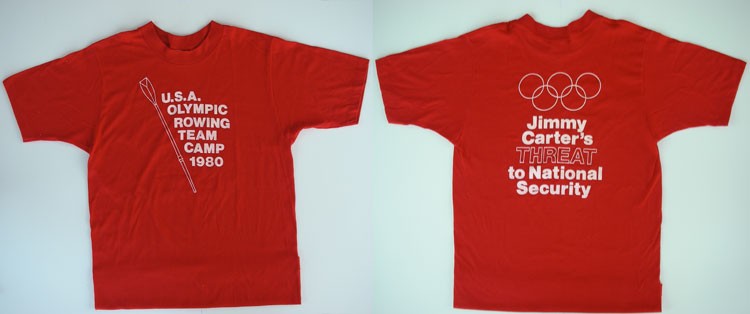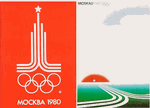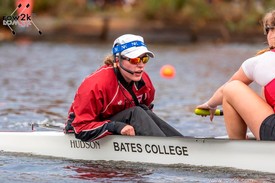The 1980 Olympic Boycott: Rowers on Missing the Games - Part 3

After the US Olympic rowing team returned from their European rowing tour in July 1980, they found themselves in the unlikeliest of roles: sitting at home watching the Olympic Games, which began on July 19th.
As the Olympics were winding down, the USOC invited the entire US Olympic team to Washington, DC, for a series of events, including a meeting with President Carter at the White House on July 30th.
"The Gold Medal I didn't want"
"Post racing in Europe, we were all just heading back home," remembers Holly Hatton, coxswain of the 1980 Women's Eight. "I was in the airport, and I had a small duffel bag with me, the bag given to us by by US rowing that said '1980 Olympic team' on it, and the man behind me, who was an American, said, 'How did you guys do in the Olympics?' This is how unbelievable this whole story was."
"I found that I couldn't bring myself to read about the Olympics in the paper, or watch any coverage on TV," added men's sweep team member Paul Prioleau. "Later, the USOC brought us all to Washington, DC, for a big team gathering with lots of receptions and tours. It was a lot of fun, but kind of bittersweet."
It's no surprise that the July 30th White House invitation elicited very different reactions among US Olympians, rowers and non-rowers alike.
"You've probably heard the story of the t-shirt that we put together," continues Hatton. "On the front, it said, 'Jimmy Carter's threat to national security,' and on the back it was the 1980 Olympic team with rings. I have to give Betts Kent credit for the wording. I had the T-shirts printed up. We actually brought them with us to Lucerne. We wore them.
"Of course, USRowing was extremely unhappy with that and we were told not to wear them while we were racing. Then, when we were invited to the White House, the teams were all invited, given the parade uniform gear, and there was a celebration at the Kennedy Center. We were then invited to the White House lawn and you could go up and basically shake Carter's hand, but I think only a few of the women's team went to shake his hand.
"The rest of us stayed on the lawn, and under our team uniform, we had worn those t shirts. So, once we got onto the lawn, we took our plaid shirts off and we had our "Jimmy Carter threat to national security" shirts walking around in the White House lawn. In fact, I think one of the Secret Service guys offered to buy one of our shirts from one of the women."

"We were invited to the White House to be personally 'thanked' by President Carter," said Fred Borchelt, who had made the team along with his brother Mark as the Coxed Pair. "I distinctly remember that some of the rowers that went had T-shirts printed up as a form of simple protest. They refused to shake his hand."
"I was definitely going to shake his hand, for several reasons: how many Americans ever get invited to the White House to meet the President? I thought, and still do think, it is one of the coolest things I have been able to do. I was fortunate to meet three: Gerald Ford in 1976 and Ronald Reagan in 1984.
"My parents supported me throughout my career and would have been heartbroken if I refused to go or to shake his hand. My father was a career Federal employee and veteran of World War II. Both of them were so proud of their only two sons when we were on the stage meeting Jimmy Carter. The pictures of us with him hung on the wall in their home for many years. Another reason that it was important for me to meet him was because I was a Federal employee at the time - a patent examiner for the US Patent and Trademark Office. I had many supporters there that helped me in my rowing career with time off for training and racing.
"To this day, when I hear athletes say they won't go to meet President Whoever, I think that it is a mistake, just like boycotting the Olympics was a huge mistake!"

For the athletes, being pulled (again) from the realm of athletics to the realm of politics was jarring, and many were torn between their raw feelings about being denied the chance to compete, and their sense of duty (and patriotism) that inevitably comes with representing your country internationally.
"I would have passed on the visit to the White House, but I didn't so that my parents could attend," added USA Men's Quad rower Brad Lewis. "They'd helped me out immeasurably over the years, so this was a small offering of thanks to them."
The athletes also received a commemorative medal, which had been ordered (but ironically not paid for) by the US Congress.
"There has been some confusion as to exactly what medal this is," said Borchelt. "It is not a Congressional Medal of Honor obviously. It's the gold medal that I did not want, and the only medal I ever received for doing nothing."
The Shared Bonds of 1980
The shared experiences and disappointments of the 1980 rowers are reflected to this day in the tight bonds between the team members.
"You noted that the 1980 team has remained tight, and you're right," said Hatton. "Through adversity, we have managed to remain close or at least dedicated to each other. We had our 20th reunion and had almost a full house there, then another successful one in our 30th year, and this year would have been our 40th. The Head of the Charles is sort of our homecoming and I would say the core of the women's eight has raced together literally since 1980."

"One of the remarkable things about this team is to look at what impact they had on rowing in the USA afterwards," adds Prioleau. "Mike Vespoli and Dick Dreissigaker make most of our equipment; Brad Lewis and Stephen Kiesling wrote books about the sport; Dick Cashin, Sean Colgan and John Chatzky provide a lot of financial support; Tom Darling is a huge part of the Para-rowing program; Kurt Somerville ran the Crash-B Sprints, not to mention all the legendary names like Harry Parker, Pete Gardner, Jim Dietz, Tiff Wood, and so many others. I'm not sure many other teams gave back quite like this bunch."
On the women's side too, members of the 1980 Olympic team maintain both sizeable presence and influence in today's rowing world.
What Remains, 40 Years Later
Even four decades after the events of 1980, athletes from the '80 USA Olympic rowing team look back with a mixture of regret, sadness and anger. And for those who might not understand how these emotions and bitterness could still be so present after the intervening years, it's a sign, more than anything, of what incredible commitment it takes to make an Olympic team in any sport. For these athletes, to have made the sacrifices involved to reach their goal, and to then have this achievement undone through political actions was a defining experience, albeit a tremendously negative one.
"The events of 1980 made me more active politically," says Carol Brown, who rowed in the 1980 US Eight. "I got involved in volunteer roles with both my sport of rowing and with the US Olympic Committee, and I have been actively committed to being sure the experience of 1980 is remembered and the true story is told and retold and retold.
"I know many believe President Carter has done many good things since he was President, but I can never forgive him for using the athletes as his political tool and for what I believe was blatant deceit and dishonesty, that he has never claimed as his own. Within the last ten years, Carter has personally continued to claim that the decision to boycott was made by the US Olympic Committee."

"We were very vocal against the boycott, and we continue to be very vocal about it today," adds Hatton. "It hasn't really died in most of us. When I'm asked about it now, I'm kind of tired about repeating the story, but I still feel strongly that the decision was wrong and it really created a tremendous a void for many of us who couldn't go on in '84 and race."
Perhaps most tangibly, missing the Games altered more than a few rowing careers, some for the better, and a few for the worse.
"After the summer of 1980, I decided to retire from international rowing," said Paul Prioleau of the US Men's sweep squad. "At that point, I had been training pretty much full time for nine years, and I was pretty burned out. I was also ready to experience some of the life that I had missed because of my training. At the time, the possibility that I could compete in another Olympics didn't really register with me, as it was so far away.
"I really wished that I had had a mentor or someone that had grabbed me by the neck and told me to take a few months off, keep in shape, and then come back for another try. The feeling of burnout would have passed, and I was 22 and in the best shape of my life. There is no guarantee that I would have made the '84 team, but at least I could have tried, and that chance will never come again. As Wayne Gretsky said: 'You miss 100% of the goals you don't shoot at'.
"Four years later, I sat in the stands at Lake Casitas, and watched many of my friends and teammates win medals in the 1984 Games. In retrospect, I really wished that I had continued on with rowing."
"I continued for 1984 because of the boycott, as did many of the women on the team" says Carol Brown, who estimates that 50% of the complete 1980 US Olympic team did not make another Olympic team.

For sculler Brad Lewis, who along with Paul Enquist would of course go on to win a famous Olympic Gold in the Men's Double at the 1984 Olympics in LA, the overwhelming feeling is one of empathy with other athletes affected by the boycott than his own missed opportunity.
"A special sort of sadness hangs over the boycott as regards athletes from other countries who were forced to boycott because of Carter's f-up," he said. "Frank and Alf Hansen won Norway's only gold medal at the 1976 Olympics. They won the 1978 and 1979 World Rowing Championships. It's truly a shame that they did not get the opportunity to win a second gold in Moscow. The exact same can be said for the hundreds of athletes from the other sports."
"At least the US did complete selection of the team in all sports so we all can say we were members of the 1980 Olympic team," adds Carol Brown. "Some countries, like Canada, did not, so those athletes have nothing."
Parallels with 2020?
For athletes, this year's Olympic postponement is the most obvious comparison with 1980, but many of the '80 athletes were quick to point out the biggest difference. "I empathize with these athletes and what they're going through but here's the difference: no one has told them they cannot compete," says Hatton. "We were told we could not, through no fault of our own, and this is, I think, the big difference between 1980 and 2020.
"If they're willing to stay on another year, they do have an opportunity to compete. The athletes, I'm sure, are drained emotionally because they were on tenterhooks waiting and waiting and waiting but, as I see it, if they're willing to kind of pull in and circle their wagons a little bit, they will have an opportunity to be on the Olympic team and represent in 2021."
Brad Lewis agrees. "To any rowers training to be Tokyo next summer but not 100% sure if it's worth the effort, the same metric applies now that should be used in non-crazy times: if you have something more important to do, then do it. Otherwise, stay the course. Keep grinding it out while you grind your teeth, cursing the pandemic. It's rotten bad timing.
"I've read that a champion athlete must have a capacity for unexpected circumstances. Well, here's a chance to strengthen your capacity for unexpected circumstances.
"It's unlikely I'll be around when it happens, but I can imagine in the year 2060, an intrepid reporter from row2k will track down a rower who was totally dialed in to compete in Tokyo 2020. Maybe win a medal. Maybe a gold medal. Then the pandemic hit and plans changed, and not for the better. Maybe this rower gets left on the dock, waving goodbye and good luck to their teammates as they rowed to the starting line. Or maybe this rower didn't even make the team. Perhaps he or she got sick with the virus and never got back the fitness level they had in January 2020.
"The US Olympic rowing team is pretty big. I'm going to guess that more than one rower will be left behind. It hurts just thinking about it. There is nothing worse than being left behind. All an elite rower ever wants is a chance to knock heads with like-minded opponents on the biggest stage the world has to offer. We, the '80 team, did not get the chance."
The ability to rebound and carry on is what Paul Prioleau would offer the athletes of today as advice.
"Years after 1980, I became very good friends with Tom and Peter Graves. Peter was coming off a summer of rowing feeling that same burnout, and I gave him the advice that I wish someone had given me. Peter later carried a 1980 Olympic Team pin I gave him into the 2012 London Opening Ceremonies for me [Peter Graves was in the 2012 USA Olympic M4x, eds]. I like to think that maybe I played a small part in helping him through a tough spot.
"As for advice to the 2020 Olympic hopefuls, I would say bear down and keep going! You didn't get to this level by giving up, and it is only a year away. It took a ton of effort to get to where you are now, and you will just get better. Take that year to go faster, higher, and stronger, and give it your best shot. You don't want to look back years later with regrets."
Authors Note: I'm indebted to 1980 Olympians Holly Hatton, Carol Brown, Tiff Wood, Paul Prioleau, Brad Lewis, Fred Borchelt, Jim Dietz and others for sharing their stories, photos and comments on this story. As a rower who grew up with bits and pieces of 1980 lore, hearing more of the full story from those involved was both powerful and poignant.
If you enjoy and rely on row2k, we need your help to be able to keep doing all this. Though row2k sometimes looks like a big, outside-funded operation, it mainly runs on enthusiasm and grit. Help us keep it coming, thank you! Learn more.
Comments | Log in to comment |
There are no Comments yet
| |
- Bont Rowing
- Calm Waters Rowing
- Concept 2
- Craftsbury Sculling
- The Crew Classic
- CrewLAB
- Croker
- Dad Vail Regatta
- Durham Boat Co.
- Empacher
- Faster Masters
- Filippi
- Fluidesign
- h2row.net
- HUDSON
- Live2Row Studios
- Nielsen-Kellerman
- Oak Ridge RA
- Peinert Boat Works
- Pocock Racing Shells
- Race1 USA
- RowKraft
- Rubini Jewelers
- Vespoli USA
- WinTech Racing
- Bont Rowing
- Calm Waters Rowing
- Concept 2
- Craftsbury Sculling
- The Crew Classic
- CrewLAB
- Croker
- Dad Vail Regatta
- Durham Boat Co.
- Empacher
- Faster Masters
- Filippi
- Fluidesign
- h2row.net
- HUDSON
- Live2Row Studios
- Nielsen-Kellerman
- Oak Ridge RA
- Peinert Boat Works
- Pocock Racing Shells
- Race1 USA
- RowKraft
- Rubini Jewelers
- Vespoli USA
- WinTech Racing















